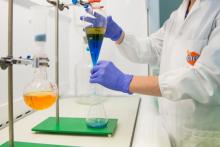ASX-listed biotechnology company, PharmAust has secured Monash Health Human Research Ethics Committee approval for a Phase I clinical trial to assess the effectiveness of its monepantel product in combating motor neuron disease. Twelve trial participants will be tested in the fourth quarter this year. The trial has about A$880,000 of funding from charitable organisation, FightMND Australia.


ASX-listed biotechnology company, PharmAust has secured Monash Health Human Research Ethics Committee approval for a Phase I clinical trial to assess the effectiveness of its monepantel product in combating motor neuron disease. Twelve trial participants will be tested in the fourth quarter this year to gauge safety and efficacy measures of monepantel.
The trial has about A$880,000 of funding from charitable organisation, FightMND Australia.
PharmAust will collaborate with the Melbourne-based Calvary Health Care Bethlehem and Sydney’s Macquarie University to deliver trial outcomes.
Motor neuron disease, or “MND” affects human nerve cells controlling vital everyday functions. It can result in progressive loss of motor neurons that control muscles, impacting movement and breathing.
Two Australians are diagnosed with the rare and fatal disease each day with a lifetime risk of developing MND being one in 300. Some 140,000 new patients around the world are diagnosed with MND each year. Average life expectancy for those afflicted is reportedly just 27 months.
With no known cure researchers and industry are working around the clock to find effective treatments for MND. The upcoming clinical trial will bring PharmAust to the fore in the battle against the disease.
The company has now obtained approvals from the Monash Health Human Research Ethics Committee to conduct the clinical trial, involving 12 people living with MND.
PharmAust is developing a tablet form of monepantel specifically for the Phase I trial.
The trial will involve conventional dose escalation with each dose level lasting for 28 days. Efficacy of the product will also be evaluated with the aim of expanding the Phase I trial into a more advanced Phase II clinical trial.
PharmAust has previously conducted pre-clinical programs to test monepantel as a treatment for MND, showing that the product has potential to activate molecular pathways germane to treatment of the disease.
If effective monepantel could reduce degeneration rates and loss of motor neurons in the anterior horns and motor nuclei of the brainstem.
In September last year PharmAust and principal investigators, Dr Susan Mathers from Calvary Health Care Bethlehem and Professor Dominic Rowe from Macquarie University, secured $881,085 from FightMND specifically for the upcoming Phase I trial.
Founded in 2014 by former Australian Rules footballer, Neale Daniher, FightMND is a charitable organisation established with the sole aim of finding effective treatments and ultimately a cure for MND. The charity has committed more than $48 million to research since its inception.
PharmAust’s Chief Scientific Officer, Dr Richard Mollard said: “PharmAust is privileged and delighted to be working with Dr Mathers, Professor Rowe, FightMND, Monash Health and Macquarie University with the common aim of finding positive outcomes for people living with ALS/MND. PharmAust is especially thankful to FightMND and all its supporters who make this type of work possible.”
PharmAust anticipates monepantel ultimately being designated as an “orphan drug” by the Food and Drug Administration for the indication of MND. As an orphan drug monepantel would be given special status that would deliver financial gains to the company.
PharmAust is finalising negotiations with laboratories that can formally accept monepantel as an orphan drug.
Is your ASX-listed company doing something interesting? Contact: matt.birney@businessnews.com.au













